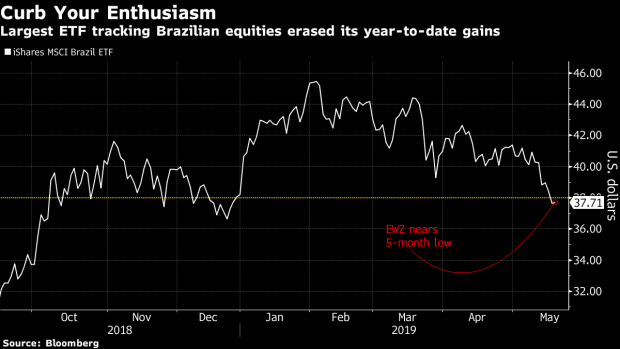May 17, 2019
Brazil Piles on the Pain as It Leads Emerging Markets Lower
, Bloomberg News

(Bloomberg) -- Things got ugly in Brazil this week as a heady mix of nationwide protests, political tensions and crumbling growth estimates added to a wave of pessimism sweeping across emerging markets.
The real underperformed all developing-nation peers, falling to the lowest level in eight months on Friday, as traders reassessed odds for the government’s flagship pension reform. The largest exchange-traded fund tracking Brazilian equities, the $8 billion iShares MSCI Brazil ETF, erased its year-to-date gain and the Ibovespa stocks index fell into correction on Thursday, down 10% from its peak in Mid-March.
Tens of thousands of demonstrators marched through major cities to protest a freeze to the education budget, adding to the headwinds buffeting President Jair Bolsonaro’s legislative agenda. Earlier this week, the lower house approved a motion to summon the education minister for a hearing, and local media reported that Lower House President Rodrigo Maia, the most influential person in the pension bill debate, would be mentioned in a plea deal in a corruption case.
In another setback to Brazilian assets, firms including BNP Paribas and Goldman Sachs cut their growth forecasts for this year after an economic activity index showed a bigger than expected contraction in March. The lack of growth would keep Brazil’s credit profile weak even if a robust pension reform is approved, Fitch Ratings said.
"Markets are repricing their views on pension reform, growing downside risks to growth, and a poor global backdrop for EM," said Win Thin, the New York-based global head of currency strategy at Brown Brothers Harriman. “We have the perfect recipe for a weaker real. Protests didn’t help."
Brazil wasn’t alone. All but one of 24 emerging-market currencies are weakening this week and stocks fell as trade tensions between the U.S. and China escalated, with both countries increasing tariffs. Activity data from the two countries also disappointed economist forecasts, bringing back concerns about global growth.
Brazil’s real crossed past the key psychological level of 4 per dollar and traded firmly above that, fueling the debate about possible central bank intervention. Citi strategists said authorities would likely step in if the currency reaches 4.2 per dollar, which was 2018’s low.
"I think the real at 4 per dollar is cheap and some stocks are getting cheap as well," said Greg Lesko, a portfolio manager at Deltec Asset Management in New York. "This is likely to be a bumpy ride, but I still expect social security reform to happen and Brazilian assets to rise."
To contact the reporters on this story: Aline Oyamada in Sao Paulo at aoyamada3@bloomberg.net;Vinícius Andrade in São Paulo at vandrade3@bloomberg.net
To contact the editors responsible for this story: Julia Leite at jleite3@bloomberg.net, Philip Sanders
©2019 Bloomberg L.P.


